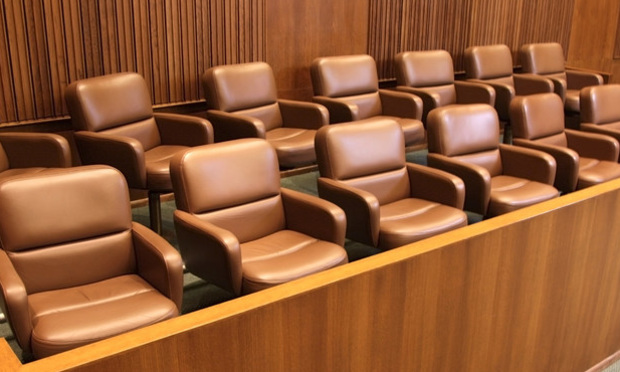Libby Harrison, Unheralded Legal Scholar and Unsung Hero
On November 1, 2017, Albany attorney Lisabeth—Libby—Harrison died at the age of 69. Most members of the New York bench and bar do not recognize Libby's name. Given her substantial contributions to New York law, that is both unfortunate and unjust.
November 21, 2017 at 03:36 PM
8 minute read

On November 1, 2017, Albany attorney Lisabeth—Libby—Harrison died at the age of 69. Most members of the New York bench and bar do not recognize Libby's name. Given her substantial contributions to New York law, that is both unfortunate and unjust. In fairness to her dedication and fidelity to the law, and her many efforts to improve it, a review of Libby's career is warranted.
After graduating magna cum laude from the State University of New York at Stony Brook, Libby attended St. John's University Law School. She enjoyed significant success in Queens: Libby was the editor of the law review and graduated magna cum laude. After law school, Libby spent 15 years as a law clerk to two New York State Court of Appeals Judges—Hon. Dominic L. Gabrielli and Hon. Vito J. Titone. Her clerkships were followed by tours with the Appellate Division, Third Department; the New York State Capital Defenders Office; and the Appeals Bureau of the Legal Aid Society. As those positions demonstrate, her commitment to justice was manifest. Libby then transitioned from the public to the private sector, practicing law with the firm of Mintz & Gold, LLP. She would remain with the firm for the remainder of her career.
Libby enjoyed a well-earned reputation as a first-rate legal talent: exceedingly intelligent, hardworking, reliable and successful. Thus, Libby could have been content with (and proud of) the resume she amassed. She could have focused exclusively on the practice of law in the Capital District and eschewed other professional undertakings. But she did not.
In 2003, Libby joined the Committee on Pattern Jury Instructions, Civil, of the Association of Justices of the Supreme Court of the State of New York, the Committee charged with maintaining the PJI treatise. The Committee is made up of a select group of Supreme Court Justices—some trial judges, some Appellate Division judges—and two (sometimes three) “reporters.” The reporters, who are not judges, review developments in the law and suggest changes to the treatise based on those developments. Also, the reporters revise individual sections of the treatise. The proposed changes and revisions are reviewed by the judicial members of the Committee. That review is thorough and substantial, and requires close interaction among the judicial members of the Committee and the reporters. The Committee works throughout the year, meeting approximately nine times. Its efforts are reflected in the five-volume PJI treatise that is published every December.
For the better part of 15 years, Libby was a stalwart steward of the PJI treatise, effecting thousands of changes to the charges and comments—all while maintaining her law practice. She added new authority to the comments, reformed and polished existing text, and created new sections of “the books.” (This year alone, Libby, among other things, substantially revised the negligent misrepresentation section and created a section for right of privacy.) Libby worked to improve all four substantive volumes (volumes 1A, 1B, 2A and 2B). Her unmatched efforts and dedication to the committee made an excellent publication even better. Simply put, no individual did more over the past 15 years than Libby to make the PJI treatise the authoritative work it is.
Given the importance of the PJI treatise to the New York bench and bar, and the considerable and unrivaled contributions Libby made to the publication for a decade and a half, it is clear that Libby had a sizable impact on New York law. It is clearer still that judges and lawyers will benefit for years to come from Libby's industry, as her words and wisdom are ingrained in the treatise.
Hon. David Demarest, J.S.C. (ret.), Chair of the PJI Committee;
Hon. Leon D. Lazer, J.S.C. (ret.), Chair Emeritus of the PJI Committee;
and John R. Higgitt, reporter to the PJI Committee

On November 1, 2017, Albany attorney Lisabeth—Libby—Harrison died at the age of 69. Most members of the
After graduating magna cum laude from the State University of
Libby enjoyed a well-earned reputation as a first-rate legal talent: exceedingly intelligent, hardworking, reliable and successful. Thus, Libby could have been content with (and proud of) the resume she amassed. She could have focused exclusively on the practice of law in the Capital District and eschewed other professional undertakings. But she did not.
In 2003, Libby joined the Committee on Pattern Jury Instructions, Civil, of the Association of Justices of the Supreme Court of the State of
For the better part of 15 years, Libby was a stalwart steward of the PJI treatise, effecting thousands of changes to the charges and comments—all while maintaining her law practice. She added new authority to the comments, reformed and polished existing text, and created new sections of “the books.” (This year alone, Libby, among other things, substantially revised the negligent misrepresentation section and created a section for right of privacy.) Libby worked to improve all four substantive volumes (volumes 1A, 1B, 2A and 2B). Her unmatched efforts and dedication to the committee made an excellent publication even better. Simply put, no individual did more over the past 15 years than Libby to make the PJI treatise the authoritative work it is.
Given the importance of the PJI treatise to the
Hon. David Demarest, J.S.C. (ret.), Chair of the PJI Committee;
Hon. Leon D. Lazer, J.S.C. (ret.), Chair Emeritus of the PJI Committee;
and John R. Higgitt, reporter to the PJI Committee
This content has been archived. It is available through our partners, LexisNexis® and Bloomberg Law.
To view this content, please continue to their sites.
Not a Lexis Subscriber?
Subscribe Now
Not a Bloomberg Law Subscriber?
Subscribe Now
NOT FOR REPRINT
© 2025 ALM Global, LLC, All Rights Reserved. Request academic re-use from www.copyright.com. All other uses, submit a request to [email protected]. For more information visit Asset & Logo Licensing.
You Might Like
View All
Absent Explicit Agreement, Court Rejects Unilateral Responsiveness Redaction of Text Messages
10 minute read

A Time for Action: Attorneys Must Answer MLK's Call to Defend Bar Associations and Stand for DEI Initiatives in 2025
5 minute readTrending Stories
- 1Thursday Newspaper
- 2Public Notices/Calendars
- 3Judicial Ethics Opinion 24-117
- 4Rejuvenation of a Sharp Employer Non-Compete Tool: Delaware Supreme Court Reinvigorates the Employee Choice Doctrine
- 5Mastering Litigation in New York’s Commercial Division Part V, Leave It to the Experts: Expert Discovery in the New York Commercial Division
Who Got The Work
J. Brugh Lower of Gibbons has entered an appearance for industrial equipment supplier Devco Corporation in a pending trademark infringement lawsuit. The suit, accusing the defendant of selling knock-off Graco products, was filed Dec. 18 in New Jersey District Court by Rivkin Radler on behalf of Graco Inc. and Graco Minnesota. The case, assigned to U.S. District Judge Zahid N. Quraishi, is 3:24-cv-11294, Graco Inc. et al v. Devco Corporation.
Who Got The Work
Rebecca Maller-Stein and Kent A. Yalowitz of Arnold & Porter Kaye Scholer have entered their appearances for Hanaco Venture Capital and its executives, Lior Prosor and David Frankel, in a pending securities lawsuit. The action, filed on Dec. 24 in New York Southern District Court by Zell, Aron & Co. on behalf of Goldeneye Advisors, accuses the defendants of negligently and fraudulently managing the plaintiff's $1 million investment. The case, assigned to U.S. District Judge Vernon S. Broderick, is 1:24-cv-09918, Goldeneye Advisors, LLC v. Hanaco Venture Capital, Ltd. et al.
Who Got The Work
Attorneys from A&O Shearman has stepped in as defense counsel for Toronto-Dominion Bank and other defendants in a pending securities class action. The suit, filed Dec. 11 in New York Southern District Court by Bleichmar Fonti & Auld, accuses the defendants of concealing the bank's 'pervasive' deficiencies in regards to its compliance with the Bank Secrecy Act and the quality of its anti-money laundering controls. The case, assigned to U.S. District Judge Arun Subramanian, is 1:24-cv-09445, Gonzalez v. The Toronto-Dominion Bank et al.
Who Got The Work
Crown Castle International, a Pennsylvania company providing shared communications infrastructure, has turned to Luke D. Wolf of Gordon Rees Scully Mansukhani to fend off a pending breach-of-contract lawsuit. The court action, filed Nov. 25 in Michigan Eastern District Court by Hooper Hathaway PC on behalf of The Town Residences LLC, accuses Crown Castle of failing to transfer approximately $30,000 in utility payments from T-Mobile in breach of a roof-top lease and assignment agreement. The case, assigned to U.S. District Judge Susan K. Declercq, is 2:24-cv-13131, The Town Residences LLC v. T-Mobile US, Inc. et al.
Who Got The Work
Wilfred P. Coronato and Daniel M. Schwartz of McCarter & English have stepped in as defense counsel to Electrolux Home Products Inc. in a pending product liability lawsuit. The court action, filed Nov. 26 in New York Eastern District Court by Poulos Lopiccolo PC and Nagel Rice LLP on behalf of David Stern, alleges that the defendant's refrigerators’ drawers and shelving repeatedly break and fall apart within months after purchase. The case, assigned to U.S. District Judge Joan M. Azrack, is 2:24-cv-08204, Stern v. Electrolux Home Products, Inc.
Featured Firms
Law Offices of Gary Martin Hays & Associates, P.C.
(470) 294-1674
Law Offices of Mark E. Salomone
(857) 444-6468
Smith & Hassler
(713) 739-1250







